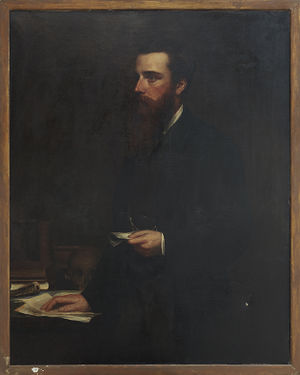James Hunt
Contents
Notes
Office Notes
ESL Council 1859-60 Member [Secretary from Mar. 1860]
ESL Council 1860-61 Hon. Secretary
ESL Council 1861-62 Member [ill Feb. 61]
ESL Council 1862-63 Hon. Foreign Secretary
ASL Council 1863 [1st and new July] President
ASL Council 1864 President
ASL Council 1865 President
ASL Council 1866 President
ASL Council 1867 Director
ASL Council 1869 Vice President (ex president)
House Notes
FSA MRSL Hon. Foreign Sec. of the RSL, Foreign Associate of the Anthropological Society of Paris, Corr. mem. of the Imperial Leopoldino-Carolina Academia Naturae Curiosum, Upper Hesse Society for Natural and Medical Science
ESL: auditor 1857; auditor 59; proposed for Council May 59; appointed joint honorary secretary Mar 60; Committee on changes in Council May 60; delegate at BA Oxford 60; Publications committee Nov 60; resigns as Hon. Sec. Feb 61; Committee to arrange Anniversary dinner 61; finance committee 61; sub-committee to report on Mr Clarke's portraits Mar 62; ESL: Honorary Foreign Secretary (new office) 62; retires as Hon. Foreign Sec. May 63
contributes £5 to Eyre Defence and Aid Fund
1869.10.12 death announced Obit in Presidential Address 1870 by Beddoe
Notes From Elsewhere
James Hunt (1833-29 August 1869) was a speech therapist in London, England who had among his clients Charles Kingsley, Leo Tennyson (son of the poet laureate Alfred Tennyson) and Lewis Carroll (Charles Lutwidge Dodgson) author of Alice’s Adventures in Wonderland.
Lewis Carroll was a children’s author, mathematician, and clergyman but had a severe stammer that affected his job. The 1861 census shows that Charles Lutwidge Dodgson was staying at Ore House in 1961 and being treated by Dr Hunt a Psellismolligist. Since his book was published in 1865 it is quite possible that some of it was written during his stay.
His other main interest was in anthropology and in 1863 he established the Anthropological Society of London, which after his death merged with the more established Ethnological Society of London to become the Royal Anthropological Institute.
James Hunt (1833–1869) was an exuberant character, giving to each of his ventures his boundless energy and self-confidence.[1] Taking up his father's legacy with great zeal, by the age of 21 Hunt had published his compendious work, "Stammering and Stuttering, Their Nature and Treatment". This went into six editions during his lifetime and was reprinted again in 1870, just after his death, and for an eighth time in 1967 as a landmark in the history of speech therapy.[1] In the introduction to the 1967 edition of the book, Elliot Schaffer notes that in his short lifetime James Hunt is said to have treated over 1,700 cases of speech impediment, firstly in his father's practise and later at his own institute, Ore House near Hastings,[6] which he set up with the aid a doctorate he had purchased in 1856 from the University of Giessen in Germany.[7]
In later, expanded editions, "Stammering and Stuttering" begins to reflect Hunt's growing passion for anthropology exploring, as it does, the nature of language usage and speech disorders in non-European peoples.[1] In 1856, Hunt had joined the Ethnological Society of London and by 1859 he was its joint secretary.[1] He was not, however, a popular man within the society as many of the members disliked his attacks on religious and humanitarian agencies represented by missionaries and the anti-slavery movement.[7]
As a result of the antagonism, Hunt founded the Anthropological Society and became its president,[7] a position that would be taken up by his nephew almost sixty years later.[8] It was mainly to do with Hunt's efforts that the British Association for the Advancement of Science (BAAS) accepted anthropology in 1866.[1]
Even by Victorian standards, Hunt was a decided racist.[1] His paper "On a Negro's Place in Nature", delivered before the BAAS in 1863, was met with hisses and catcalls.[7] What Hunt saw as "a statement of the simple facts"[9] was in fact a defence of the subjection and slavery of African-Americans and a support of the belief in the plurality of human species.[7]
In addition to his extremist views, Hunt also led his society to incur heavy debts.[1] The controversies surrounding his conduct told on his health and, on 29 August 1869, Hunt died of "inflammation of the brain" leaving a widow, Henrietta Maria, and five children.[7]
Publications
External Publications
Stammering and Stuttering, Their Nature and Treatment"
A manual of the philosophy of voice and speech
House Publications
ESL Report of ethnological papers read at Manchester
on the acclimatization of man
ASL on the Negro: his place in nature Read 17.11.63
on psychological anthropology; its aim and method
on physiological anthropology: its aim and method
Related Material Details
RAI Material
Other Material
British Library, Bristol U., Imperial College Archives [corresp.]
